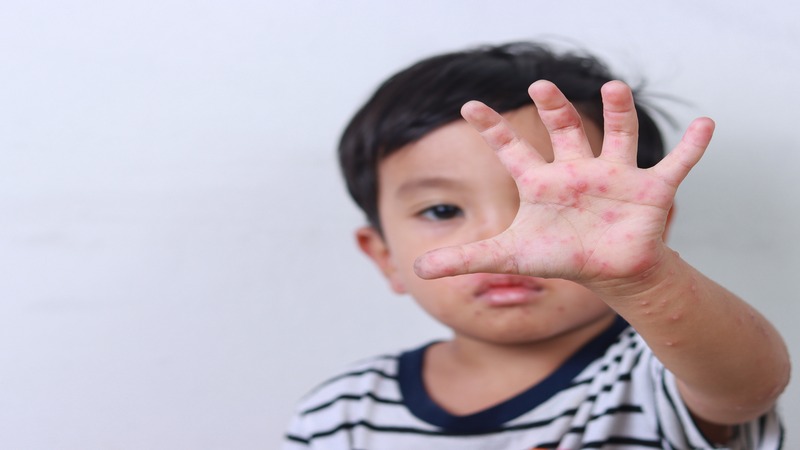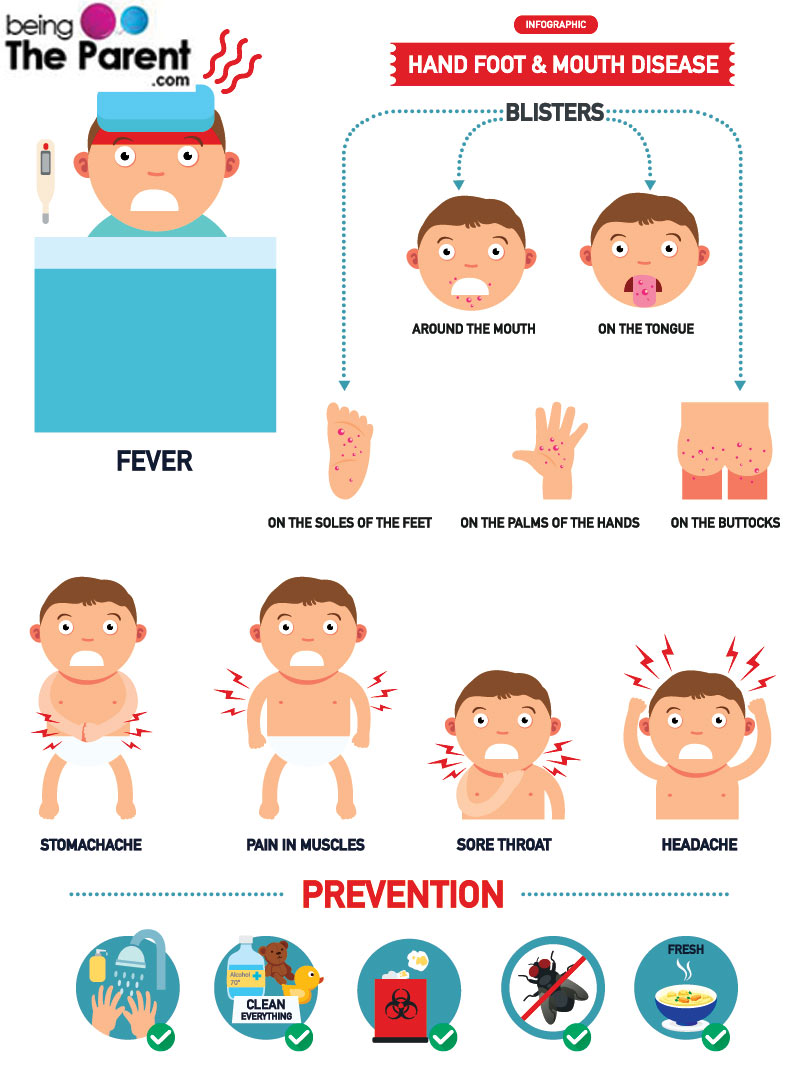
Infants have a weak immune system and hence are prone to many infections and diseases. One of the most common diseases that affect babies is Hand, Foot and Mouth disease. Lets know about it in detail.
What Is Hand-Foot And Mouth Disease?
Hand, Foot and Mouth disease (HFMD) can affect individuals of any age but it mostly occurs in toddlers and preschoolers. Mostly seen in children less than 10 years, often under 5 years, HFMD can be a distressing experience for your child. This disease causes painful sores on the hands, mouth, butt and feet. This illness can occur any time of the year but it mostly occurs in summer.
What Causes Hand-Foot And Mouth Disease?
HFMD is caused by various viruses such enterovirus and coxsackievirus A16. The virus is generally contracted through coughing and sneezing. If young babies touch their stools, mostly during a diaper change, and touches something that other children may put in their mouth, this disease could break out. Children often touch things and put their hands in their mouths, which is a major and the most common cause of the Hand-Foot And Mouth Disease.
In rare cases HFMD can lead to viral meningitis. Sometimes HFMD can also cause inflammation in the brain but in children it does not get to an extreme level and they can generally recover from HFMD in 8-10 days.
What Are The Symptoms Of Hand-Foot And Mouth Disease?
The incubation period, that is the period when the symptoms tend to surface is 3-6 days after exposure to the virus.
In the early stages the baby gets a slight fever and sore throat. The fever will vary from 101°F to 103°F. Fever is generally the first symptom of HFMD. You will also notice a loss in appetite. In a couple of days sores may begin to appear on the hands, feet, the mouth and sometimes even the butt. The baby might not want to drink as much water or any other fluids since the sore in the mouth might be painful and intake of fluids will cause irritation. The baby might even develop rashes on the feet and on the palms and these rashes soon turn into blisters. It is not necessary that your baby will get all the above mentioned symptoms. In some cases the baby might not get rashes or the sores might be quite small and less painful.
Is Hand-Foot And Mouth Disease Contagious?
Even though HFMD is not a very dangerous virus it is highly contagious. This virus is easily spread through coughing and sneezing. Your baby can also catch this virus by touching infected stools. If a baby is infected with HFMD his stool carries the virus. If another baby happens to touch that stool, he might get infected too. Similarly this virus is present in the fluids discharged from the body like saliva, nasal discharge and urine and if another baby that touches it might get infected. HFMD is most contagious in the first week.

When Should I Call The Doctor For Hand-Foot And Mouth Disease
Since HFMD is a virus you cannot administer antibiotics to the baby. Hence the doctor won’t be able to help you much but when it comes to your baby it is best you take him or her to the doctor anyway.
An amateur cannot determine whether the baby is infected with HFMD just by observing the symptoms. Only a doctor can confirm whether it is HFMD or not that ails your baby. Even though the doctor won’t prescribe many medicines, he will give you proper advice about what you should and shouldn’t do when your baby is infected with HFMD. Most of the times the symptoms are not severe and your baby will recover soon but if the fever doesn’t come down in a day or two take your baby to the doctor immediately. Also if the sores become too painful and your baby stops eating or drinking completely, see the doctor as early as possible.
Can My Baby Get Hand-Foot And Mouth Disease More Than Once? How Can I Prevent It?
Yes, HFMD can re -urface even if the baby was infected by it previously. Hence, it is crucial that you keep your baby’s surroundings clean. Wash and thoroughly clean the things that the baby touches frequently like his or her toys. Also wash your baby’s hands and feet often during the course of the day. Hygiene plays a key role and it is imperative that your baby stays clean thus reducing the risk of infection. Make sure you and your baby wash your hands frequently. Everyone at home should follow this religiously.
How Can I Care For My Baby With Hand-Foot And Mouth Disease?
- First and foremost make sure that your baby is drinking plenty of fluids. Since the body looses a of lot fluids it is crucial that you keep your baby hydrated. It also helps treating sore throat
- Avoid spicy and acidic food. Give your baby light yet nutritious meal that won’t irritate the sores in the mouth
- For the fever you can give your baby prescribed fever medicines. Consult your doctor as to how much and when you should give the medicine
- For the sores in the mouth you can apply baby teething gel, which is easily available in the local pharmacy. You could rub it gently on the sores. If your baby doesn’t have fever you could give him a little ice cream or popsicles that will relieve the itching sensation for some time
- Since HFMD is contagious, make sure your baby maintains distance from the kids infected with HFMD. Also if your baby is infected, avoid sending him out to play with other kids
- HFMD can cause a lot of itching and pain and hence make the baby irritable, be patient with the baby
With proper care, your baby will get better soon.

